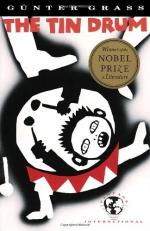|
|
The Tin Drum Chapter 28: The Imitation of Christ
When Oskar returned home, nothing had changed. The only difference was in Alfred, who shed authentic, speechless tears when he saw Oskar. Oskar resolved at that moment to recognize Alfred as a potential father and call himself Matzerath in addition to Bronski. They took him in, but the questions began. They were angry that Oskar had simply disappeared, for they had had to swear to the police that they had not killed him. Now that he was back, a representative from the Ministry of Public Health came by to place Oskar in a mental institution, but Alfred refused because he had promised Agnes that he would not do so. Every two weeks there was a letter in the mail asking for Alfred's release to take Oskar away, but Alfred refused to sign.
For his third birthday the next day, Kurt received several toys that he dismantled or broke immediately. Oskar's son was already an inch taller than Oskar; it was time, he thought, to make the boy a drummer and put an end to the needless growth. Since Oskar had not taken over the store, Oskar presumed that Alfred planned to turn it over to Kurt - this, Oskar thought, had to be prevented at all costs. He wanted to create Kurt in his own image. Oskar fantasized of the two of them drumming together, and sharing the same ideals of childhood, history, and family. At that time, Oskar thought that true family life was only possible under his grandmother Anna's skirts. Today, however, he can supersede the holy trinity with a snap of his fingers - the imitation of Christ has become an occupation. He has fantasies that Anna will invite Jan, Maria, Agnes, and the other Bronskis to a meeting under her skirts. He shudders at the possibilities, contenting himself with the thought of himself and Kurt alone under the skirts.
Oskar relates to the reader his giving three-year-old Kurt the drum. He dropped the sailboat he was destroying and took the drum. As Oskar was handing him the drumsticks, Kurt misinterpreted the action and knocked the sticks to the ground. Oskar bent to pick them up, and Kurt hauled off and struck him with the drum, then hit him repeatedly until Oskar collapsed. Then he took the drum and chipped off the lacquer on a chair, then began to beat it with his broken sailboat toy - no rhythm was discernible.
In the coming months, Stephan Bronski was killed on the eastern front lines. Next, Fritz Truczinski was killed on the western front. This caused Mother Truczinski to have a small stroke, from which she never fully recovered. As a result of her brother's death, Maria found religion. She started going to Protestant services, but they did not satisfy her. She became a Catholic, like Oskar's mother. She took Oskar one afternoon to the church of the Sacred Heart so she could be converted. Leaving her to prayer, Oskar went to inspect the statue of the Virgin Mary with the boys John the Baptist and Jesus. Nothing in the church, even the expressions on the boys' faces, had changes from years before. Once again, as he had done years before, he placed his drum around the boy Jesus' neck. But now he did not want a miracle, he just wanted to show Jesus up. Oskar laughed as he placed the drumstick in the statue's hands; he challenged Jesus to drum. And all of a sudden, he did:
"While round us nothing stirred, he started in with his right stick, then a tap or two with his left, then both together. Blessed if he isn't crossing his sticks, say, that roll wasn't bad. He was very much in earnest and there was plenty of variety in his playing. He did some very complicated things but his simple rhythms were just as successful. There was nothing phony about his playing, he steered clear of gimmicks and just played the drum. His style wasn't even religious, and there was no military vulgarity about it. He was a musician, through and through, but no snob. He knew all the hits. He played 'Everything Passes,' which everyone was singing at the time, and, of course, 'Lili Marlene.' Slowly, a little jerkily perhaps, he turned his curly head with the blue Bronski eyes toward me, smiled, rather arrogantly it seemed to me, and proceeded to weave Oskar's favorites into a potpourri..." Chapter 28, pg. 357
Oskar became angry with Jesus; he took back his drum in anger. As Oskar ran away with his drum, Jesus asked him three times: "Dost thou love me?" Becoming more angry, Oskar replied finally: "You bastard, I hate you, and all your hocus-pocus." Triumphantly, Jesus replied: "Thou art Oskar, the rock, and on this rock I will build my church. Follow thou me!" Chapter 28, pg. 358. Oskar hissed with rage.
Topic Tracking: Individuality/Identity 11
Back in the attic, Oskar took his rage out on old light bulbs. He sang several to pieces, then inscribed JESUS on another in Sütterlin script.




